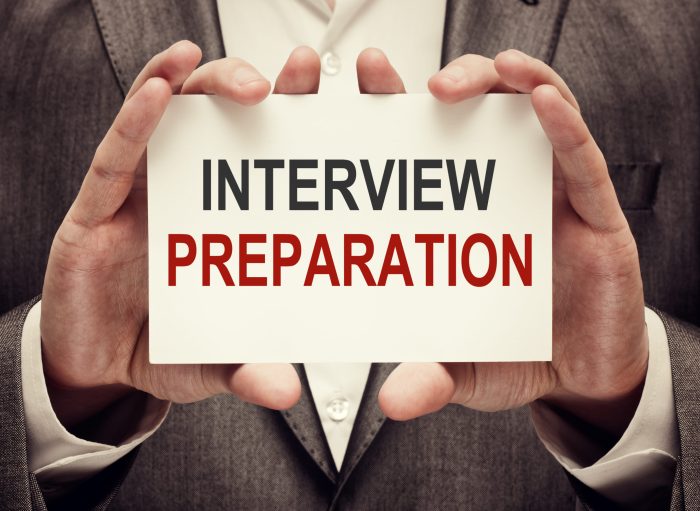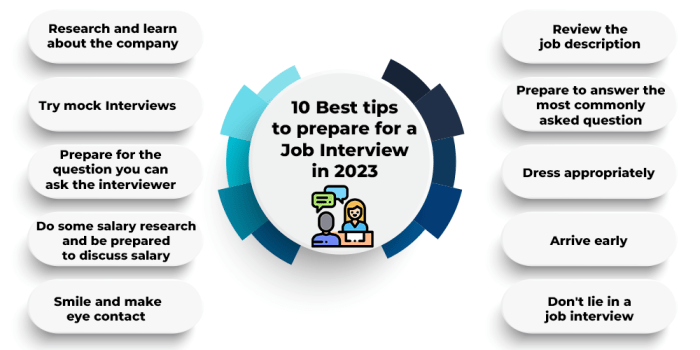Job Interview Preparation sets the stage for landing your dream job by diving into essential strategies and techniques that can make all the difference in acing that crucial interview. From researching the company to perfecting your body language, this guide covers it all.
Are you ready to take your interview game to the next level? Let’s dive in!
Researching the Company
Before a job interview, it is crucial to research the company to show your interest and preparedness. Knowing about the company can help you tailor your answers to align with their values and goals, making you a more attractive candidate.
Where to Find Information
1. Company Website: Start by exploring the company’s official website to learn about their history, mission, products/services, and team.
2. Social Media: Follow the company on platforms like LinkedIn, Twitter, and Facebook to stay updated on their latest news and initiatives.
3. News Articles: Look for recent news articles or press releases about the company to understand their current standing in the industry.
4. Glassdoor: Check employee reviews on Glassdoor to gain insights into the company culture and work environment.
Benefits of Knowing About the Company, Job Interview Preparation
- Customize Your Responses: Tailor your answers during the interview to showcase how your skills and experiences align with the company’s needs.
- Show Genuine Interest: Demonstrating knowledge about the company shows your genuine interest in the position and sets you apart from other candidates.
- Ask Informed Questions: Being aware of the company’s background allows you to ask thoughtful questions during the interview, showing your engagement.
- Connect with Interviewers: Referencing specific company achievements or initiatives can help you establish a connection with the interviewers.
Understanding the Job Description: Job Interview Preparation
When preparing for a job interview, one of the most crucial steps is to thoroughly understand the job description. This document Artikels the requirements, responsibilities, and qualifications needed for the position, providing valuable insights into what the employer is looking for in a candidate.
Aligning Skills with Job Requirements
Analyzing the job description allows you to align your skills and experiences with the specific requirements of the role. For example, if the job description mentions strong communication skills as a key requirement, you can prepare examples from your past experiences that demonstrate your ability to effectively communicate ideas and collaborate with team members. By tailoring your responses to highlight how your skills match the job requirements, you can showcase yourself as the ideal candidate for the position.
Tips for Analyzing a Job Description
- Read the job description carefully, paying attention to s and phrases that indicate the key responsibilities and qualifications.
- Identify the core competencies and skills required for the role, and make a list of how your own experiences align with these requirements.
- Look for any specific instructions or preferences Artikeld in the job description, such as preferred qualifications or certifications.
- Consider the company culture and values reflected in the job description, and think about how you can demonstrate your fit with the organization during the interview.
Common Interview Questions
When preparing for a job interview, it’s essential to anticipate the questions that employers commonly ask. This will help you formulate strong and confident responses, showcasing your qualifications and suitability for the position.
Behavioral and Situational Questions
- Behavioral questions are designed to assess how you have handled specific situations in the past. Examples include “Can you describe a time when you had to work under pressure?” or “Tell me about a challenge you faced in a previous job and how you overcame it.” To prepare for these questions, reflect on your past experiences and identify relevant examples that demonstrate your skills and abilities.
- Situational questions present hypothetical scenarios and ask how you would respond. For instance, “How would you handle a conflict with a coworker?” or “What would you do if a project deadline was moved up unexpectedly?” When preparing for these questions, consider the key qualities the employer is looking for and tailor your responses accordingly.
Importance of Practicing Responses
- Practicing your responses to common interview questions is crucial for several reasons. It helps you become more comfortable discussing your experiences and qualifications, reducing nervousness during the interview. Additionally, practicing allows you to refine your answers, ensuring they are clear, concise, and relevant to the job requirements.
- By practicing responses, you can also avoid sounding rehearsed or robotic. Instead, you’ll come across as authentic and engaged, making a positive impression on the interviewer. Remember, preparation is key to acing your interview and landing the job!
Body Language and Communication

When it comes to a job interview, your body language can speak volumes before you even say a word. It’s important to pay attention to how you present yourself through non-verbal cues to make a positive impression on the interviewer.
Maintaining Good Eye Contact and Posture
- Make sure to maintain good eye contact throughout the interview to show attentiveness and confidence. Avoid staring too intensely or looking away too often.
- Sit up straight with your shoulders back to convey professionalism and engagement. Avoid slouching or fidgeting, as it can give off a negative impression.
- Practice mirroring the interviewer’s body language to establish rapport and show interest in the conversation.
Impact of Non-Verbal Cues on Interviewer’s Perception
- Your body language can convey your level of confidence, enthusiasm, and interest in the position. A firm handshake, smile, and good posture can leave a lasting positive impression.
- Avoid crossing your arms, frowning, or displaying nervous habits like tapping your foot, as these can signal discomfort or lack of confidence.
- Remember that the interviewer is not only listening to your words but also observing your body language to gauge your suitability for the role.
Dressing for Success

Dressing appropriately for a job interview is crucial as it forms the first impression that a potential employer will have of you. Your outfit can convey professionalism, confidence, and respect for the opportunity. It is essential to choose professional attire that aligns with the company culture and the job position you are applying for.
Choosing Professional Attire based on Company Culture
When selecting your outfit for a job interview, it is important to consider the company culture. Research the company beforehand to understand their dress code and overall vibe. Here are some general guidelines:
- Dress formally for traditional corporate settings.
- Opt for business casual attire for more relaxed environments.
- Showcase your personal style while still looking polished and professional.
Grooming and Personal Presentation Tips
Paying attention to grooming and personal presentation can enhance your overall look and boost your confidence during the interview. Here are some tips to keep in mind:
- Ensure your clothes are clean, ironed, and well-fitted.
- Maintain good personal hygiene, including fresh breath and tidy hair.
- Minimize accessories and opt for a subtle and professional look.
- Choose neutral colors and avoid flashy or distracting patterns.
